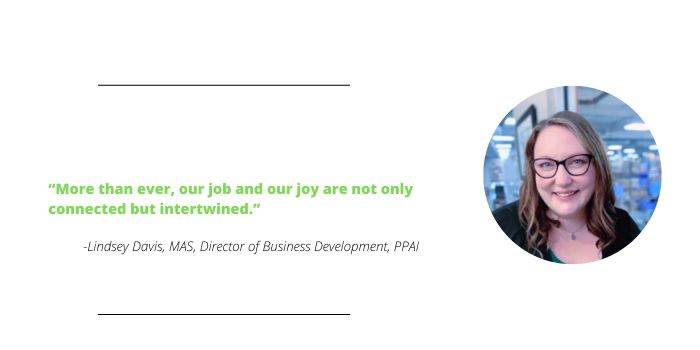Your Business: Creating Job Joy

If you’ve ever been in a personal funk, you know that it makes it hard to be your best in your work. Likewise, during the times when you’ve been killing it in your promo business, you probably feel more satisfied and less anxious in other areas of your life.
In an age when most professionals carry their entire job in their hip pocket, the idea of work/life balance is toast. Instead, we should focus of finding ways to create happiness that spills over into all areas of life. More than ever, our job and our joy are not only connected but intertwined.
Employees want joy in their jobs for the obvious reasons – I mean, half of our waking hours during the week are spent on the clock – but also for more personal reasons, such as knowing their work has meaning. As a sales leader, I want my employees to have joy in their work because I care about them and also because job joy can ignite the two things that I believe make salespeople great: confidence and effort.
Confident salespeople are better salespeople. A confident pitch inspires trust and closes more deals. But more importantly, salespeople simply aren’t as good when they aren’t confident in their company’s ability to deliver. Job joy creates a level of trust in an organization that generates confidence in its mission, its integrity and its ability to deliver.

As for effort, it’s required of everyone on some level. Good salespeople put in plenty of effort. But the secret to really unlocking a person’s true potential is in inspiring discretionary effort, the level of effort people will give above and beyond the minimum required. This doesn’t mean more time spent working, but rather more engagement during their working time. It might mean asking better questions during a discovery call, seeking out referrals for new business, writing personal thank-you notes or getting quotes out quickly. Because discretionary effort is strongly correlated to employee engagement, it is another benefit to any leader who makes a conscious decision to grow the job joy of their teams.
Creating joy at work doesn’t require a massive overhaul. It can happen with simple actions every day. Here are a few do’s and don’ts to help you inspire job joy in your team.
COMMUNICATE ON PURPOSE
What doesn’t work?
- Mass communication about important topics that isn’t preceded by personal conversations from leaders. This is especially true for the people directly impacted by the news you are sharing.
- Low or poor communication in general. If you aren’t talking with your teams regularly, too much is left up to speculation and assumptions, which is rarely positive.
What works?
- Being transparent and honest. When your team understands the why behind a decision – or better yet, helped you make it – they will be more confident and engaged.
- Share information intentionally. Before you shoot off a quick note on messaging platform, ask a few questions. Does my team need to act on this information immediately? If yes, that quick message is probably a good choice. Will my team need to find this information again later? If yes, you might want to consider an email instead. Is this topic complicated or requiring more conversation? If yes, consider holding off until your next team meeting.
PROVIDE REAL BALANCE
What doesn’t work?
- Work hard, play hard. It is impossible to give 100% to everything. Extended effort toward this impossible platitude creates burnout.
- Trying to make things equal. Providing balance for your team members won’t always look the same for everyone. Fair isn’t always equal, and that’s OK.
What works?
- Give trust and create clarity. Fully understand that expectations, goals and boundaries help build confidence and the ability for your team members to own their work.
- Be flexible. Encourage time off when someone needs a break, offer flex hours to help people avoid heavy traffic, and support that occasional long lunch or late morning.
VALUE THEIR WORK
What doesn’t work?
- Messy systems slow salespeople down. Time spent searching for the right file or relearning a difficult process is time wasted, and a lack of improvement can leave your team feeling less valuable.
- Pizza parties. If after a hard project or a big goal, your team recognition is another catered lunch, you aren’t being intentional enough in your recognition of their work.
What works?
- Investing in each team member’s development not only shows you value them, but also that you see them as a long-term contributor to the success of your organization.
- Recognizing your team members’ efforts is vital and should include kudos from you and other leaders on your staff. Using incentives and bonuses can be a great way to show longer-term recognition, but don’t forget to use our unique marketing medium to make memorable connections with your own team – a great promo product always creates joy.
Joy at work leads to strong and lasting engagement, which can build confidence and effort from your sales team. This doesn’t mean there won’t be hard days, missed goals and failed projects. Instead, for people and teams with high job joy, those inevitable stressors are not major disruptions but minor distractions on the path to success.
Davis is the director of business development at PPAI.

